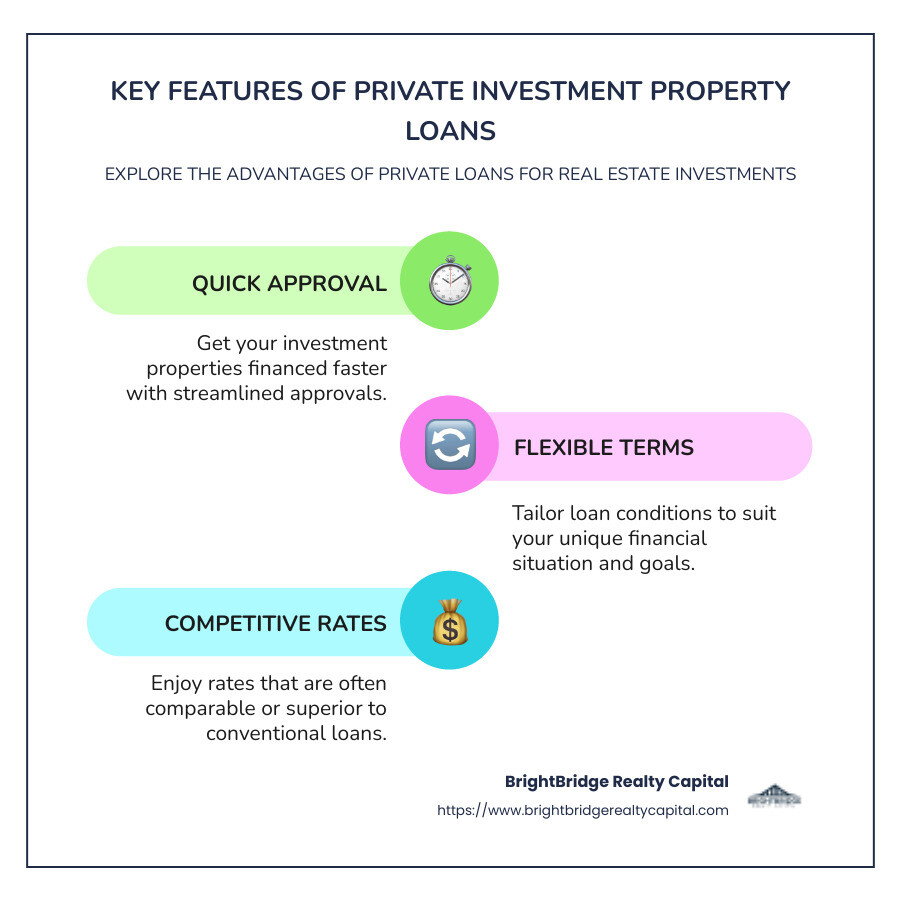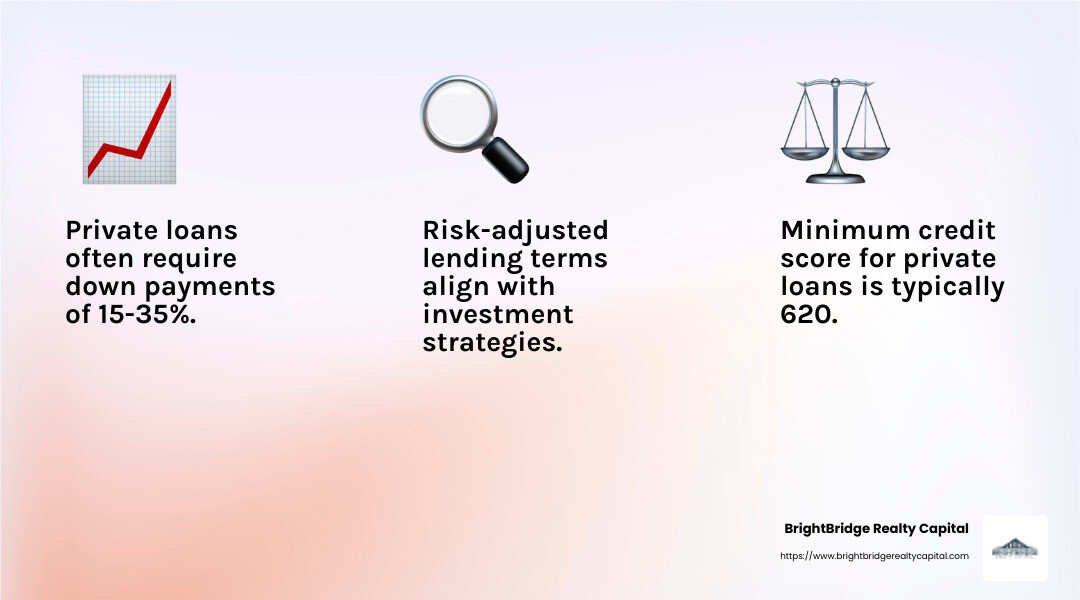The Insider's Guide to Private Investment Property Loans

Private investment property loans are a vital tool for real estate investors looking to expand their portfolios or undertake fix-and-flip projects without the constraints of traditional lending. These loans offer quick and flexible financing options, allowing you to seize investment opportunities in a market. Here’s what you need to know right away:
- Quick Approval: Private loans often have faster approval times than conventional loans.
- Flexible Terms: They can be custom to unique financial situations and investment goals.
- Competitive Rates: These loans can sometimes offer rates that rival or even beat conventional options.
- Higher Risk Tolerance: Lenders are more focused on the property's income potential rather than just financial history.
Real estate investments are a proven method for generating steady income and achieving long-term wealth. But navigating the complex world of financing these investments can be daunting, especially when traditional bank loans seem stuck in slow-motion and red tape.
That's where private investment property loans come in: they streamline the process, provide the flexibility needed to close deals quickly, and offer competitive rates. Whether you’re growing your rental portfolio or targeting your next flip, these loans are designed to work with, not against, your real estate ambitions.
In this guide, we’ll explore how these loans can be leveraged to maximize your investment potential and what you'll need to qualify.

Private investment property loans vocab to learn:
Understanding Private Investment Property Loans
When it comes to private investment property loans, understanding the key differences from traditional loans is essential. These loans are custom for investors who need quick and flexible funding solutions, and they operate under different parameters than conventional loans.
Higher Down Payments
One of the first things you'll notice with private loans is the requirement for a higher down payment. Typically, lenders may ask for anywhere from 15% to as much as 35% down, depending on your credit score and the property's potential. This higher initial equity can be daunting, but it also reduces the lender's risk, making it easier for them to approve the loan quickly.
Stricter Credit Requirements
While private loans are more flexible in some ways, they can also come with stricter credit requirements, particularly for investment properties. A minimum credit score of 620 is often expected, with higher scores needed for better terms. Lenders focus on your ability to handle multiple properties, so they scrutinize your financial stability and past investment successes.
Risk-Adjusted Lending
These loans are known for being risk-adjusted, meaning the terms are custom to the perceived risk of the investment. Higher perceived risks, such as a property needing extensive repairs or located in a less stable market, might result in higher interest rates. However, the flexibility of private loans allows you to negotiate terms that align with your investment strategy, balancing risk with potential returns.

In summary, private investment property loans are designed for investors who need fast, flexible financing. They require higher down payments and stricter credit checks but offer risk-adjusted terms that can be negotiated to fit your investment goals. By understanding these elements, you can better steer private lending and leverage these loans to grow your real estate portfolio.
Types of Private Investment Property Loans
When diving into private investment property loans, it's crucial to understand the different types available. Each option has its unique characteristics and can cater to varying investment needs. Let's explore three popular types: hard money loans, DSCR loans, and portfolio loans.
Hard Money Loans
Hard money loans are short-term loans typically used by real estate investors who need quick cash. These loans are backed by the property's value rather than the borrower’s creditworthiness. They are ideal for fix-and-flip projects where speed is essential.
Pros:
- Fast Approvals: Get funding in days, not weeks.
- Less Documentation: Focus on the property, not personal credit.
Cons:
- High Interest Rates: Can be significantly higher than traditional loans.
- Short Terms: Usually require repayment within 1-3 years.
DSCR Loans
Debt Service Coverage Ratio (DSCR) loans are based on the property's cash flow. They are perfect for investors focused on rental income. Lenders look at the property's ability to cover its debts, rather than personal income.
Pros:
- Cash Flow Focused: Approval based on rental income potential.
- No Income Verification: Streamlined process without tax returns.
Cons:
- High Down Payments: Typically need a substantial equity stake.
- Higher Rates: Reflects the risk of relying solely on property income.
Portfolio Loans
Portfolio loans are for investors managing multiple properties. These loans are kept by the lender and not sold to the secondary market, allowing for more flexible terms.
Pros:
- Custom Terms: Lenders can customize terms to fit your needs.
- Flexibility: Easier qualification for diverse property types.
Cons:
- Higher Costs: Interest rates and fees can be higher due to lender risk.
- Balloon Payments: Some loans might require a large payment at the end.
Each type of loan offers distinct advantages and challenges. Understanding these can help you choose the right private investment property loan for your real estate strategy. Whether you're flipping houses, building a rental empire, or managing multiple properties, there's a private loan custom to meet your needs.
Benefits of Private Investment Property Loans
When you're exploring private investment property loans, there are several key benefits that stand out. These loans offer unique advantages that can make them an attractive option for real estate investors.
Flexibility
One of the biggest perks of private loans is their flexibility. Unlike conventional loans, private loans often come with terms that can be negotiated. This means you can work with the lender to tailor the loan to fit your specific investment strategy. Whether you need a loan for a short-term fix-and-flip project or a long-term rental property, private lenders can adjust the terms to suit your needs. This flexibility extends to credit and income requirements, making it easier for investors with less-than-perfect credit histories to secure financing.
Fast Closings
Time is money in real estate, and fast closings are a significant benefit of private loans. Traditional bank loans can take weeks or even months to close due to extensive paperwork and approval processes. In contrast, private loans often close much quicker, sometimes in just a few days. This speed can be crucial when you're trying to secure a property in a competitive market or need to act quickly on a promising investment opportunity. Fast closings give you the edge to seize deals before other investors.
Competitive Rates
While private loans are often associated with higher interest rates, they can still offer competitive rates compared to other high-risk financing options like hard money loans. Many private lenders are willing to offer attractive rates to investors with strong property prospects or those who can demonstrate a solid investment plan. Moreover, private lenders may offer creative financing solutions, such as interest-only payments or deferred payments, which can help improve cash flow during the early stages of property investment.
These benefits make private investment property loans a valuable tool for investors looking to expand their real estate portfolios. Whether you're seeking flexibility, speed, or competitive financial terms, these loans can provide the leverage you need to succeed in the dynamic world of real estate investing.
How to Qualify for Private Investment Property Loans
Securing private investment property loans can be a smart move for real estate investors, but it requires meeting certain qualifications. Here’s a simple guide to help you understand what lenders typically look for.
Credit Score
Your credit score plays a crucial role in qualifying for a private loan. While private lenders may be more flexible than traditional banks, they still prefer borrowers with a solid credit history. A credit score of 620 is often the minimum requirement, but having a score of 700 or above can give you access to better terms and lower interest rates. If your credit score needs improvement, consider strategies like paying off outstanding debts or requesting credit line increases.
Cash Reserves
Lenders want to see that you have enough cash reserves to cover mortgage payments, especially for investment properties. It's common for lenders to require proof of six to 12 months of cash reserves. This shows that you can continue making payments even if your property doesn’t immediately generate rental income. Having substantial reserves not only helps you qualify but also demonstrates your commitment to the investment.
Loan Requirements
Private lenders have their own set of requirements, which can vary widely. However, some common factors include:
- Down Payment: Expect to put down at least 20% to 25% of the property’s purchase price. A higher down payment can sometimes result in better loan terms.
- Property Appraisal: You will need an appraisal to assess the property's value and potential rental income. This helps the lender determine the risk involved.
- Experience: If you have a track record of successfully managing rental properties, it can work in your favor. Some lenders may ask for documentation of your property management experience.
Meeting these qualifications can improve your chances of securing a private investment property loan. That each lender is different, so it’s wise to shop around and find one that aligns with your investment goals.
Next, we’ll dive into some frequently asked questions about private investment property loans to further clarify this financing option.
Frequently Asked Questions about Private Investment Property Loans
What is the typical down payment for a private investment property loan?
When it comes to private investment property loans, the down payment is typically higher than what you might see with conventional loans. Expect to put down at least 20% to 25% of the property's purchase price. This larger down payment helps offset the higher risk that private lenders take on. If your credit score is strong or you have significant investment experience, you might negotiate slightly better terms.
How do private investment property loans differ from conventional loans?
Private loans differ from conventional loans in several key ways. First, private loans often have more flexible terms. This flexibility allows for quicker closings, which can be crucial in competitive real estate markets. Unlike conventional loans, which heavily weigh personal income and employment history, private loans may focus more on the potential rental income of the property. However, this flexibility often comes with higher interest rates and fees, reflecting the increased risk to the lender.
What are the risks associated with private investment property loans?
While private investment property loans offer many benefits, they also come with certain risks. The higher interest rates and fees can increase the overall cost of the loan. Additionally, the shorter loan terms often associated with private loans might require refinancing sooner than expected. Borrowers should also be aware that the less regulated nature of private loans means there could be less protection compared to conventional loans. It's essential to thoroughly review the loan terms and understand the potential financial impact before committing.
By understanding these aspects, you can make informed decisions and strategically plan your investment moves. Next, we'll explore the conclusion and how BrightBridge Realty Capital can offer customized solutions for your investment needs.
Conclusion
As we wrap up our guide, it's clear that private investment property loans offer a unique blend of flexibility and speed, which can be a game-changer for real estate investors. Here at BrightBridge Realty Capital, we understand that each investor has distinct needs and goals. That's why we focus on providing customized solutions custom to fit your specific investment strategy.
Our approach is centered around a seamless process that removes the usual problems and delays often associated with real estate financing. With our expertise, you can expect fast closings—often within a week—and competitive rates that are hard to match. This means you can seize opportunities as they arise without the stress of drawn-out loan approvals.
Whether you're expanding your rental portfolio or diving into fix-and-flip projects, our direct lending model ensures you get the funding you need, when you need it. We cut out the middleman, providing you with a straightforward and efficient path to securing your investment property loans.
Explore how our team at BrightBridge Realty Capital can support your real estate ventures. Find our range of services and start your investment journey today.
Thank you for considering us as your partner in real estate investment. We are excited to help you achieve your financial goals with confidence and ease.


